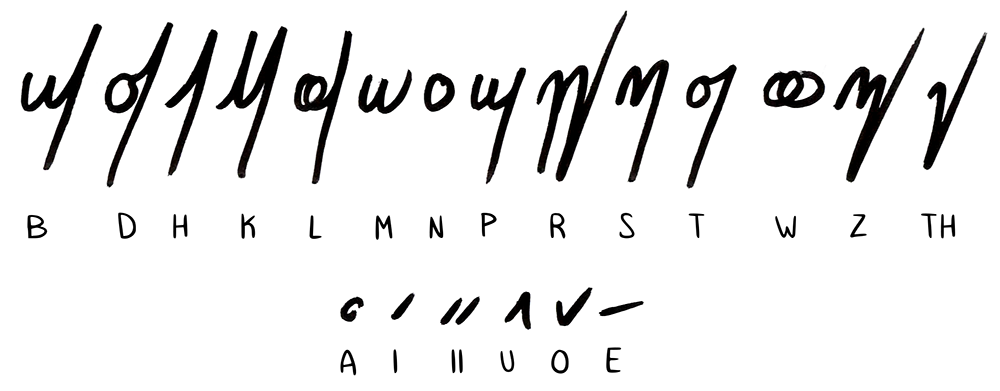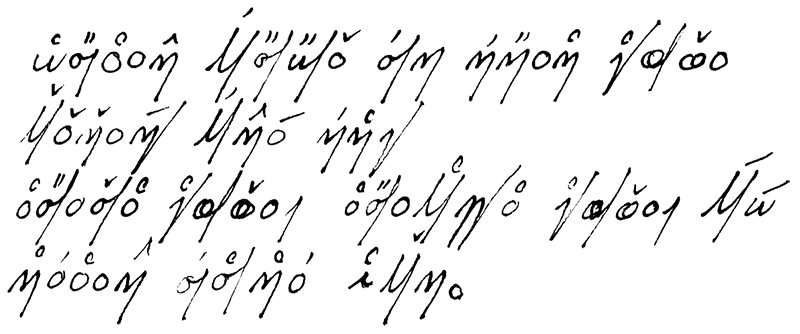Xema
| DATE | 2006-2016 |
| GENERAL RULES |
No diphthongs, only in borrowed terms. Hugely complicated, many cases. |
| RELATED |
Eloa world-building page Bys-sáma Rac,mamoqei Aŝan |

Along with Rac,mamoqei, Xema is one of my oldest and thoroughly developed languages. It was created for a fantasy world I was writing when I was younger and it's ridiculous, I'm very fond of it.
Xema is the primary language of the Tipan Empire. The grand capital of this sprawling empire is the holy city of Kalamurth, where Xema was born. Although day-to-day most inhabitants of Tipa speak the simpler sister language Bys-sáma, Xema still holds fast as the language of politics and religion.
Pronouns
Xema has a complicated system of pronouns. The speaker must be aware of their own place in the hierarchy as well as the listener's or that of the subject of conversation. Misuse of pronouns is considered extremely rude and confrontational.
| subject | I | you | they | it | we |
| topic of conversation* | alwin | hal | durn | sath** | miin |
| close by | alwinthe | halwinthe | duninthe | sathinthe | mininthe |
| far away | alwinta | halinta | duninta | sathinta | mininta |
| younger | alwiine | haliine | duriine | sathiine | miinine |
| same age | alwina | halina | durina | sathina | miinina |
| older | alwinan | halinan | durinan | sathinan | miininan |
| casual | alwe | hone | dune | sane | mine |
| superior | alwinanth | halinanth | durinanth | sathinanth | miininanth |
| inferior | alwon | hon | duron | sathon | mithon |
| many | alwene | halene | durnene | sathene | miinene |
| two or three | alwenin | halenin | durnenin | sathenin | miinenin |
* The "topic of conversation" pronoun is only used once a subject has been introduced and is the topic of conversation. A specific pronoun is usually only used once, but can be repeated for emphasis.
** sath is also used to refer to an abstract topic, though other pronouns may be used if the speaker wishes.
- Pronouns must also be used in conjunction with a case prefix.
- The final vowel of a case prefix may be dropped if the pronoun begins with a vowel.
| AFFIX | CASE |
| si- | nominative (subject) |
| ti- | accusative (direct object) |
| mi- | dative (indirect object) |
| kos- | ablative (movement or cause) |
| thi- | genitive ("of" or possessive) |
| na- | vocative (addressee) |
| ki- | locative (location) |
| nu- | instrumental (object used to perform action) |
- The speaker is often put in last place to show deference.
- nakiini tihone salwe, "I saw you"
- BUT: nakiini sihone talwe, "you saw me"
Verbs
- Infinitive indicated by -n suffix (eg. xalthan, "to be") which is replaced by tense when conjugating.
- Don't conjugate according to person (eg. xalthasu salwin, "I am"; xalthasu sidurn, "they are").
- A negative is indicated by a ko- prefix.
| AFFIX | TENSE | EXAMPLE |
| -su | present | xalthasu salwin, "I am" |
| -xe | near future | xalthaxe salwin, "I will be soon" |
| -thu | distant future | xalthathu salwin, "I will be one day" |
| -ni | near past | xalthani salwin, "I was recently" |
| -tu | distant past | xalthatu salwin, "I was long ago" |
| -pe | present conditional | xalthape salwin, "I would be" |
| -nape | past conditional | xalthanape salwin, "I would have been" |
| -ma | present progressive | xalthama salwin, "I am being" |
| -thima | future progressive | xalthathima salwin, "I will be being" |
| -nama | past progressive | xalthanama, "I was being" |
| none | imperative | xalthan, "be!" |
Example sentences
-
English: Did they (in the distance) see us (close by)?
Xema: kane nakiini siduninta timininthe
Transliteration: question see.past nominative.they(DISTANCE) accusative.us(CLOSE) -
English: We (younger) made it (topic of conversation) for you (older).
Xema: kunani tisath mihalinan simiinine
Transliteration: make.past accusative.it(TOPIC) dative.you(OLDER) nominative.we(YOUNGER) -
English: I (casual) will see you (casual) in the distant future (uncertain).
Xema: nakiithu tihone kun salwe
Transliteration: see.far-future accusative.you(CASUAL) uncertain nominative.I(CASUAL) -
English: If you (inferior) were there, I (superior) would have seen you (topic of conversation).
Xema: xu xanathani kamam sihon xe, xiim nakiinape salwinanth tihal xe
Transliteration: if1 locate.recent-past there nominative.you(INFERIOR) if2, then1 see.past-conditional nominative.I(SUPERIOR) accusative.you(TOPIC) then2
Numbers
| 1 | 2 | 3 | 4 | 5 | 6 | 7 | 8 | 9 | 0 |
| ale | rile | diirle | hale | hiine | mole | xana | dine | kupe | nur |
For numbers with multiple digits, you read out the numbers from smallest to largest. The final vowel is dropped when reading out numbers except for the final digit.
- 47: xanhale
- 3629: kuprylmoldiirle
Like every aspect of Xema, the number system is unnecessarily complicated. Numbers must also be appended to a counter to indicate what is being counted, and there are a bonkers number of counters. This system does mean that a speaker does not have to follow the number with the noun of what is being counted; they can just say "six" and the counter will give the listener context.
| COUNTER | AFFIX | COUNTER | AFFIX | COUNTER | AFFIX |
| animals (birds) | o- | flat things | nix- | mouthfuls | iir- |
| animals (farm) | xar- | flower petals | fo- | nights | ta- |
| animals (fish) | thi- | food (fruit) | hok- | people (alive) | tok- |
| animals (riding) | xek- | food (veg) | liinan- | people (dead) | sim- |
| animals (other) | dor- | food (other) | tiron- | plants | lika- |
| armour | kirn- | games | arod- | questions | din- |
| art | mith- | groups/pairs | siim- | religious things | anta- |
| bags/baskets | dar- | holes | ales- | sentences | iil- |
| boxes | ral- | insects | san- | steps | ran- |
| buildings | diirk- | instruments | thur- | smaller than fist | mo- |
| clothes | uk- | languages | an- | tools | tun- |
| colours | kap- | lights | dii- | vehicles | piin- |
| containers | iisan- | medicine | miil- | water | kurim- |
| countries | kodur- | moments | fe- | weapons | bil- |
| days | ka- | money | xel- | misc. things* | ba- |
| drinks | aru- | mountains | tas- |
* ba- can be used to count anything that doesn't have a specific counter.
- 47 farm animals: xarxanhale
- 3629 live people: tokuprylmoldiirle (modified from tok-kup[...] as consonants can't be followed by the same consonant)
Writing system

Writing examples
